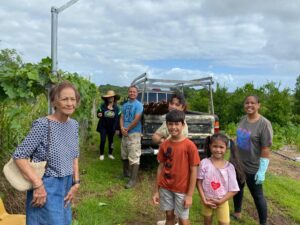Final report for RGR20-003
Project Information
The demand for locally grown agricultural products continues to rise and the need for food security is a given in the Micronesian region. Majority of agricultural producers in the region lack the knowledge of the development and management of sustainable agroforestry farming. Small-scale agroforestry systems were once dominant throughout the islands of the Western Pacific. This tradition is slowly declining. Along with traditional methods, modern innovative practices and a wider variety of fruits and vegetables can be revived. Isolated islands contain fragile and limited natural resources, particularly water and soil. These natural resources need to be protected, enhanced and sustained to ensure long-term viability for agroecosystems. It is important to understand the parameters of developing and sustaining such agroforestry systems. The expected outcome of this proposed project is to educate, increase skills and knowledge of agricultural professionals and producers on developing and managing sustainable agroforestry systems. This project aims to: (1) Enhance and maintain an existing model agroforest system at the University of Guam and develop new agroforestry systems or improve existing agroforestry system owned and operated by 1 or 2 local producers. (2) Conduct on-site workshops on each site focusing on the development and management of the integrated small-scale sustainable agroforest system at each respective site that have participated in the grant. The maintenance and improvement of the existing UOG demonstration model agroforest system, will expand to participating cooperator(s) emphasizing on practicality and feasibility, and focusing on ready-available resources of each island. Development of online ready-available outreach material and the conducting of workshops will further extend the knowledge and resources of sustainable agroforestry throughout the islands of the Western Pacific.
- The primary objective of this proposed project is to build agriculture professionals’, producers’, and the general public’s skills and knowledge of developing and managing a sustainable small-scale agroforestry system. Participants will understand the importance of growing food to enhance food security. They will learn traditional and modern agroforestry concepts and conservation practices that aim to optimize plant production in small, manageable areas while sustaining and enhancing natural resources, particularly soil and water.
- The second objective is to further educate agriculture professionals, producers, and the general public of the potential of the profitability of small-scale agroforest systems. A highly productive agroforest system can result in surplus food that can turn into monetary profits for growers thus improving livelihoods of producers and meet some of the demands of locally produced foods, leading to an increase in local economies.
- The third objective is to continue to promote and emphasize the importance of sustainable agriculture throughout the region and how consuming locally grown produce leads to healthier lifestyles, maintain traditional cultivation knowledge and adopt modern cultivation methods that sustain soil and water quality for current and future generations.
Micronesia’s tropical climate provides the possibility to cultivate crops year-round. Although traditional agroforestry still exists throughout Micronesia, it has decreased within the past several decades. Reasons for decline in the region are highly due to development, high dependency on imported foods, western methods of cultivation, lack of resources, and a reduction of recruitment of producers. At least 90% of food consumed on Guam is imported (Marutani et al, 1997), which is similar in many neighboring islands. Diet and workforce changes of the past 40 years have resulted in a high reliance on imports and decreasing number and output of farms. These islands are at risk of region-wide food insecurity especially if there is an interruption to imports. With a huge decrease in sustainable traditional agroforestry systems, a whole body of cultural knowledge, production, processing, preservation, and consumption is disappearing. On Guam, two generations of farmers were lost and while, not as advanced, these same trends are taking place throughout Micronesia impacting island food security, health, and economy. There is a need for a professional and producer workforce trained in sustainable modern and traditional holistic food production. Promoting economic viability, social welfare, providing food for human needs and enhancement of natural environment are the prime focuses of sustainable agriculture (Longpichai, 2012).
The recent completion of SARE Professional + Producer grant OW15-031, Seven Trees, Seven Practices: Demonstrating Agroforestry in the Western Pacific, resulted in the development of several agroforestry systems on Guam that focused on cultivating fruit trees integrated with short-term crops within a 400 square meter plot. The systems emphasized on utilization of renewable resources, technological devices (irrigation systems), and conservation practices that aim to sustain water quality and quality, and enhance soil quality and tilth. Plots consisted of traditional and newer varieties of truck crops, which is important to increase diversity for producers and choices for consumers. Many producers concentrate on production, thus resulting in a lack of a clear understanding of the ever-changing consumer wants and needs (ATTRA, 1999).
In this proposal, we aim to improve the developed agroforest system (located at the University of Guam) derived from SARE Professional + Producer grant OW15-031 to provide as a long-term model. We look to expand the concepts of this model, and develop similar models in 1 or 2 local farms of Guam. Specific sites chosen for this projects will need to be assessed along with available resources as to what crops are important to the community and appropriate for planting in a given site’s micro-climate.
Development and maintenance of small-scale agroforestry systems can support families with local food, and possibly increase profits for current and future producers of the region. Integrating trees into the agricultural landscape has the potential to impact the local economy through increasing economic stability, diversification of local products and economies, diversification of rural skills, improved food security, improvements to the environment (both cultural and biological), and landscape diversification (Smith, 2010).
Cooperators
- (Educator)
Education & Outreach Initiatives
Provide education and training on proper and appropriate propagation methods.
Through online and/or face-to-face workshops, participants will learn proper propagation methods of food crops appropriate to grow in the Western Pacific. Workshops/trainings will include presentations, demonstrations and hands-on activity (when permitted). Participants will learn sexual and asexual plant propagation methods.
Workshops/trainings will increase knowledge and skills of participants in plant propagation methods including proper plant care in the field and/or in a plant nursery setting. Participants will consists of local producers, students, agricultural professionals, and interest groups.
Develop online outreach material (fact sheets) consisting of agroforestry crops and conservation practices applicable to the region. Fact sheets will be also be available as handouts to the general public.
Staff funded by this WSARE grant and students will be tasked to develop educational fact sheets of food crops and conservation practices that are applicable to the region. Students of the Agriculture and Life Sciences (ALS) undergraduate program of the College of Natural and Applied Sciences (CNAS), University of Guam (UOG) will be able to gain up to 3 University of Guam credits in these processes as a special project course. Through researching information, site visits, hands-on activities, and interviews with and guidance from agricultural professionals, staff and students will draft fact sheets of assigned food crops and conservation practices. Drafts will be submitted to the Publications Review Committee of Cooperative Extension & Outreach, ALS, CNAS, UOG for official publication approval. Fully approved drafts will be published and made available online and as handouts to the general public.
Future producers/agricultural professionals consisting of UOG students and staff will learn to develop outreach materials focusing on Agroforestry sustainable conservation practices and crops appropriate to the region. Researching and citing appropriate resources, students and staff will learn about growing food crops and sustainable conservation practices, and will also improve writing skills. Fact sheets will be aimed to be understood by the general public.
Through these educational outreach materials, producers, agriculture students and professionals, and interested people in general, will have easy access to learn and adopt concepts provided in the fact sheets.
Install a non-electric fence system and other conservation practices at 1 or 2 agroforestry plots of local producers (Grant Cooperators) to deter/exlclude entrance of feral ungulate (swine/deer) into agroforestry plots.
Through this grant, install 1 or 2 non-electric feral ungulate deterrent fence systems on 1 or 2 local private agroforestry systems. Feral pig populations are increasing and causing detrimental damage to agroforestry and crop farm systems in Guam. Although electric-fencing is less costly than a non-electric fence system, a non-electric fence system works better long-term and maintenance is much less than electric fence systems. Feral ungulates, particularly wild pig and deer, are known to compromise integrity of electric fence systems much easier than non-electric fence barriers. Non-electric fence systems will be installed around fields of 1 or 2 identified cooperators who actively produce food crops in agroforestry settings. Site(s) will also be used as a WSARE demonstration plot. Cooperator(s) will conduct site visits from the general public upon appointment. WSARE grant investigators will participate as presenters when available for site visits. Investigators and cooperator(s) will also conduct workshops to the general public that will include the display/demonstration of sustainable agroforestry practices other than the exclusion fence. The fence will be highlighted as a costly practice that will benefit agroforestry systems long-term.
Demonstration of food crop varieties and conservation practices applicable to the region will increase regional knowledge of agroforestry, revive traditional agroforestry, introduce modern techniques and additional varieties of food crops with the intention to increase regional food security, promote healthy lifestyles, and maintain/enhance the quality of surrounding natural resources.
Make outreach material available through social media. Such material may include video clips of workshops conducted, and highlighting specific crops and conservation practices
Broaden online access to outreach materials, events, and activities produced from this grant.
Products of this grant will be made more available by increasing general public access through online channels such as common social media venues and websites.
Continue to maintain and improve UOG Agroforestry Demonstration plot to serve as a working display for educational tours, workhops, and hands-on horticultural, cultivation, field operation activities.
The WSARE-UOG forestry demonstration plot was developed through a previous WSARE grant. This current grant has been supporting the upkeeping and improvement of this plot since the commencement of grant activities. It continuously serves as a model agroforestry plot, UOG Agriculture course outdoor lab site, and educational site for the general public for site visits and workshops.
UOG Agriculture students will practice and learn agroforestry cultivation and conservation methods that promote sustainable agriculture, food security, healthy lifestyles, and environmental awareness. Tours of the plot will continue and workshops focused on crop development and conservation practices will continue to be conducted with participants with interest including students, staff, local producers, agricultural interest groups, and the general public.
Educational & Outreach Activities
Hands on installation of micro-irrigation system for food crops (8 participants)
Collection of insect pests and plant diseases as samples to be identified. Understanding control measures to optimize crop production with environmental awareness, particularly protecting and sustaining natural resources (36 participants total)
Training on Structural pruning of windbreaks (5 participants)
Vegetative Propagation training on Air-layering of fruit trees (7 participants)
Hands on assembly of plant nursery for staging and caring for young seedlings and installing irrigation system for plant nursery (15 participants)
Since the establishment of conservation practices on both UOG and private demonstration plots supported by this WSARE grant, continuous, group and on-on-one presentation of sustainable agroforestry practices and their respective purposes are presented and demonstrated.
Participation summary:
January 29, 2022 WSARE workshop - Focus groups included two 4-H community groups consisting of a Pohnpeian group and Palauan group (13 total). Other participants included 1 agriculture professional, 1 agriculture student, and 1 local producer. The PI and Co-PI of this WSARE grant presented and trained on the advantages of having a plant nursery and the use of micro-irrigation. The Pohnpei 4-H group has a plant nursery which needs improvement. Their plant nursery supports their agroforestry plot. The Palau group is planning on assembling a plant nursery and establishing an agroforestry plot.
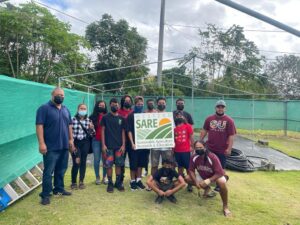
mulch to pepper plants
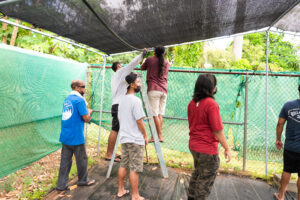
On March 7, 2022, a 2-in-1 workshop was conducted covering 2 different WSARE grants. A collaborator of this grant who also is the PI of a Farmer/Rancher grant presented on the effects of applying sheet mulching on the operation costs and yield of cultivating hot pepper. For this grant, the PI and Co-PI presented the aspects of this grant and how it had to be altered. Participants consisted of community groups of Pohnpei and Palau, local producers, a member from NRCS, and several members from the local Soil & Water Conservation Districts. The objectives of the grant were presented and conservation practices implemented on the field were discussed in detail, including discussion on the importance of the cultivation of important and potentially important food crops for variety/diversity and food security. The workshop/field day was conducted at a close to 1-acre small scale private agroforest farm managed by a collaborator of this grant. The cooperator has adopted several conservation practices that have been implemented or planned to implemented, and has adopted crop plants that have been established in his agroforest system.
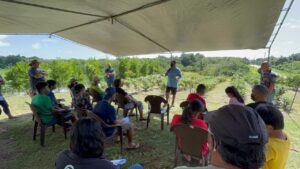
On April 8, 2022, 6 people participated in an educational tour of the UOG-WSARE Agroforest demonstration plot. On April 11, 2022, 8 people participated in an educational tour of cooperator/collaborator Glenn Takai's Agroforestry plot in southern Guam. Conservation practices and cultivated food crops were presented and discussed to participants.
During the month of May 2022, approximately 40 people toured the UOG-WSARE Agroforest demonstration plot and approximately 15 people toured Mr. Glenn Takai's Agroforestry plot where participants received presentations on all conservation practices implemented on both plots and production practices implemented to optimized crop production.
On June 18 , 2022 Representatives from the NACD, local SWCD, and local NRCS along with a few local producers toured the WSARE cooperator (Glen Takai) Agroforestry plot observing slope cultivation and conservation practices that address high erosion potential and also exclusion fence for feral animals such as pig, deer, and dogs.
On July 15, 2022 A workshop was conducted presenting sustainable agroforestry practices implemented at the UOG-WSARE Agroforestry Demonstration Plot. Information of applicable onsite fruit trees and truck crops was also disseminated through handouts and discussion. A focus group consisting of Government of Guam High School student summer employment program was the target audience as many work in agricultural environments including reforestation projects, agroforestry and agricultural plant nurseries and urban tree planting.
On August 27 and October 1, 2022. As an educational resource, the WSARE-UOG Agroforestry demonstration plot provided as the venue where Agriculture professionals guided agriculture students on identifying plant disease and physiological disorder symptoms including presence of insect/mite damage. Samples were collected and submitted to other agriculture professionals for pest, disease, or nutrient deficiency. Consultations were provided on control measures.
Several tours were conducted in November 2022 at both Agroforestry Demonstration plots. Typical sustainable practices were explained, presented, and demonstrated. Visitors included interested private producers who heard about the demonstration plots.
A UOG Extension workshop on Food Safety was conducted during the 2nd week of December 2022. Producers, Ag students, and Ag professionals (22 persons total). On December 16, 2022, the WSARE-Private Agroforestry Demonstration plot participated in this workshop. The WSARE project collaborator/cooperator, Glenn Takai, participated as a presenter at his Agroforest. Mr. Takai discussed about sustainable/conservation practices implemented including his post-harvest handling methods on his WSARE-supported farm. He also presented how WSARE assisted his farm. Participants came from University of Idaho, College of Micronesia (Yap, Pohnpei, Kosrae, Marshall Islands), Palau Community College, UoG, and general public from Guam)
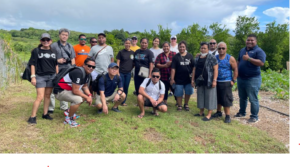
A special request guided tour occurred at Mr. Glen Takai's Agroforestry farm on January 3, 2023. A farming family requested to visit the site and learn specifically about proper mulching and drip-line irrigation.
On January 26 and February 1, 2023 - UOG campus WSARE Agroforest demonstration plot - 2 guided tours that included 46 particiapants total with 4 local producers included. The tour included routine dispersal of fact sheets on crops and conservation practices. Presentations and discussions took place amongst grant PI, Co-PI, other UOG Extension Agents and the participants
On February 7, 2023, a workshop/field day was conducted at WSARE/Cooperator Agroforestry Demo Plot in Talofo'fo', southern Guam. 8 participants attended. Grant PI presented Demo Plot activities, particularly conservation practices. Participants applied organic mulch to row crops as an activity.
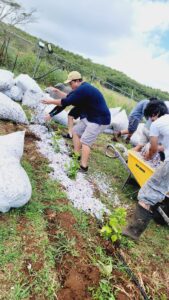
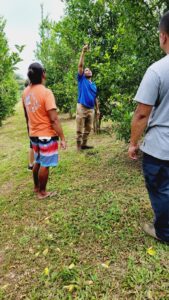
February 10, 2023, an Extension Agent (Forester) University of Hawaii and Institution of Pacific Islands Forestry visited the UOG-WSARE agroforestry plot. Professional discussions occurred amongst grant Co-PI and the Forestry professionals on many issues including promotion of agroforestry in small islands, incorporating native plants, and promoting natural resource protection.
March 16, 2023 - 2 Field tours conducted at WSARE - Private producer Agroforestry Demonstration Plot in Talofofo, Guam. Crop rotation of truck crops, mulching, drip irrigation/fertigation, and exclusion fence were the main practices presented and widely discussed with 2 Ag professionals, 1 Ag producer and 4 Ag students
April 2, 2023, - Field tour conducted at WSARE - Private producer Agroforestry Demonstration Plot in Talofofo, Guam. mulching, drip irrigation/fertigation, and exclusion fence were the main practices presented and widely discussed with 1 Ag professional, and other guest visitors
March 30, 2023 - Field tour to 150 youth of the Guam 4-H Military Youth split into 5 groups visited the UOG - WSARE Agroforestry demo plot along with other Agriculture and Life Sciences projects and programs. Grant CO-PI educated participants on agroforestry, egg layering, and aquaculture, Mr. Acosta provided the participants with a well-rounded understanding of sustainable agriculture practices.
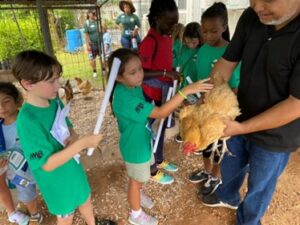
Learning Outcomes
Project Outcomes
Due to the COVID-19 pandemic, some of the original objectives of the grant could not be met. The objectives that could not be met included the participation of Agricultural professionals from the islands of Pohnpei and the Republic of the Marshall Islands in an initial workshop that was to be conducted at UOG's agroforestry demonstration plot, and for UOG Agricultural Professionals to travel down to the would have been developed agroforestry demonstration plots in Pohnpei and the Republic of the Marshall Islands for a follow-up on project progress including conducting workshops for the general public at the plots of the two islands groups. Alternative objectives were proposed and approve to include 1 to 2 local producers of Guam to establish or improve an existing agroforestry system. One local producer has been identified and has been practicing conservation practices in his agroforestry system. The other producer is yet to be identified.
September 1, 2020 - Virtual Workshop on Seed Propagation and Vegetative propagation conducted by Grant PI and Co-PI. Participants consisted of UOG Dormitory students who manage the Community Agroforestry plot located at UOG Dormitory.
The existing UOG agroforestry demonstration plot continues to be maintained and improved through this grant. Although numerous site visits occur, the most notable activity is the January 5, 2022 workshop. The workshop entailed a tour and presentation of the WSARE-UOG agroforestry demonstration plot at House 2, Dean’s Circle. Food crops appropriate to the Western Pacific were presented along with several agricultural conservation practices appropriate for small-scale agroforestry systems. The workshop also entailed basic plant propagation methods (seed propagation and propagation by cuttings of plant stems/branches. Principal and 1 Co-Investigator of this grant were the main presenters of the workshop. A UOG 4-H Extension Agent coordinated the participation of local (Pohnpei and Palau) 4-H community groups who are developing agroforestry systems on designated sites on Guam. Other participants included 2 local producers and UOG Agriculture students. Other than presentations, hands-on activities pertaining to plant propagation methods were demonstrated by WSARE grant PI and Co-PI and then performed by all participants. There have also been several tours with limited numbers people (due to COVID-19 UOG rules) that had occurred from November - December, 2021. Tours included typical presentations of existing crops and conservation practices onsite. Site tours and workshops increased awareness and understanding of starting up new agroforestry and/or maintaining and improving active existing agroforestry plots with proper propagation methods. Site presentations of food crops and conservation practice promote sustainable agroforestry with the objective of good crop production and maintaining and enhancing natural resource quality and quantity.
6 fact sheets were developed and published through this grant and are available online and as handouts at the workshop.
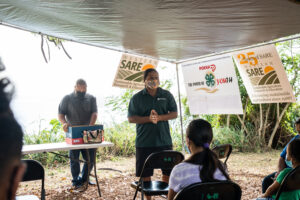
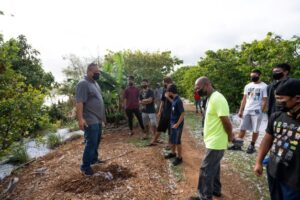
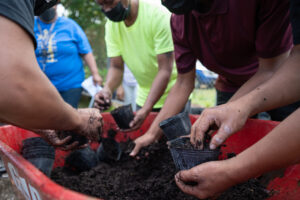
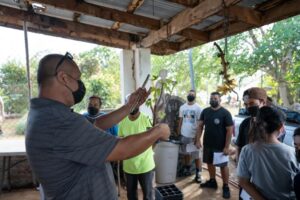
On May 25, 2023, Typhoon Mawar passed through Mariana Islands of Guam and Rota. Destructive winds of up to at least 140 mph. Many homes and farms were completely or partially destroyed. The WSARE-UOG and WSARE-private agroforestry (Talofofo) demonstration plots were devastated. All cash/truck crops were destroyed and numerous fruit trees were uprooted. However, rejuvenation of both plots commenced two weeks after completion of debris-cleaning truck crops and fruit treesboth plots. Both plots should hopefully be fully functional by September 2023 for outreach activites.
A total of 12 factsheets were fully published through this grant. The factsheets comprise of 6 conservation practices and 6 important or potential agroforestry crops for the region. They are available as hardcopies and online for public access.
For food security and soil quality enhancement, a project on farmers growing their own seed source for cover crops would be a good project. Recommended cover crop species are not readily available on Guam, and buying such seeds from off-island can be costly.
